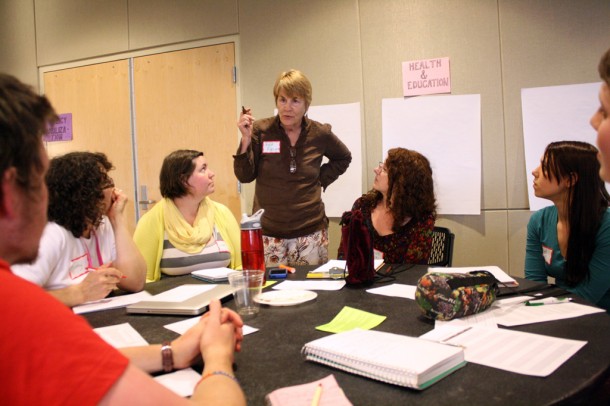
ASHEVILLE — More than a year after successfully lobbying Asheville City Council to adopt and enact its first food action plan, the Asheville-Buncombe Food Policy Council has begun charting its priorities for the year.
“Sometimes this area is called ‘Foodtopia,’ but it’s not that way for everybody,” said Emily Kujawa, who participates in the council.
The council held its first whole-group meeting on April 2, attracting dozens of attendees. The group is open to the public and is made up of concerned community members wanting to address issues of food insecurity and lack of affordable healthy food in Buncombe County.
At the meeting, participants confirmed the council’s key priorities for 2014, which are to:

- Work with community partners and policymakers to create environments that address hunger and food insecurity in Asheville and Buncombe County;
- Provide education and assistance to both the community and policymakers to increase the use of public and private land for food production; and
- Make policy recommendations, build collaborative connections and support community partners’ efforts to increase the amount of locally produced food served in Asheville and Buncombe County institutions and businesses.
Food insecurity is a prevalent issue in Western North Carolina, where 15 percent of residents experience food insecurity on a regular basis, according to a 2011 study by Feeding America.
While work continues here, statewide legislative leaders have also convened the House Committee on Food Desert Zones to research food insecurity and potentially write legislation addressing the problem throughout the state.
Food deserts — areas where it is difficult to find affordable, fresh, good quality food — are common throughout this part of the state, according to Asheville City Councilwoman Gwen Wisler, who said she supports the council’s efforts.
“That’s the front-and-center issue in Western North Carolina,” Wisler said.
How the food policy council works
ABFPC focuses on making changes to local policy, on both the city and county levels, to enhance access to food for all in the area. It’s one of several such efforts underway throughout the 18 westernmost counties of the state.
“We may not have a lot of clout when it comes to D.C.’s SNAP cuts, but we can work with the local policymakers to increase the amount of healthy food for people here,” Kujawa said.
In its short existence, the council succeeded in changing Asheville city policies. The group recommended changes to the Unified Development Ordinance to allow vendors to sell produce in their yard seven days a week, to allow for greenhouses to be built on vacant lots and more. The council also supports the opening of the Ujamaa Freedom Market, a mobile market that intends to bring fresh, local produce to underserved communities in Asheville.
In 2013, the group almost doubled the amount of “clusters” in the council. Clusters are subsets of people who meet regularly and focus specific issues related to food insecurity. Currently, the clusters include land use, farmer support, health and education, pollinators, access, policy mobilization and water.
On Wednesday, the clusters broke into small groups to suggest priority changes and to develop action plans. Later this spring, the general council, which is made up of representatives from each of the clusters, will move to approve the clusters’ proposals.
“Everyone has an opportunity to shape the direction of the Food Policy Council,” said member Tracy Kunkler.
To Learn More
The clusters meet regularly, and anyone can participate. For more information, contact info@abfoodpolicy.com.
Land Use Cluster
2nd Monday each month
4-6 p.m.
Community Room in Earth Fare (located in the Westgate Shopping Center)
Representatives: Susan Garrett, Mary Lou Kemph
Access Cluster
2nd Tuesday each month
4:30-6 p.m.
United Way Building
50 South French Broad Ave., Asheville
Representatives: Brandee Boggs, Rachel Winner
Policy Mobilization Cluster
1st Tuesday each month
4-5:30 p.m.
35 Woodfin St., Room 325
Representatives: Emily Kujawa, Darcel Eddins
Education Cluster
2nd Friday each month
9-11 a.m.
NC Cooperative Extension
94 Coxe Ave., Asheville
Representatives: Cathy Hohenstein, Brittany Wager
Farmer Support Cluster
1st Thursday each month
1 p.m.
Soil/Water District Office
155 Hilliard Ave., Suite 204, Asheville
Representative: Karen McSwain
Pollinator Cluster
For information, contact info@abfoodpolicy.com
Representative: Marielle Angel
Water Cluster
April 14
3-5 p.m.
Earth Fare (located in the Westgate Shopping Center)


